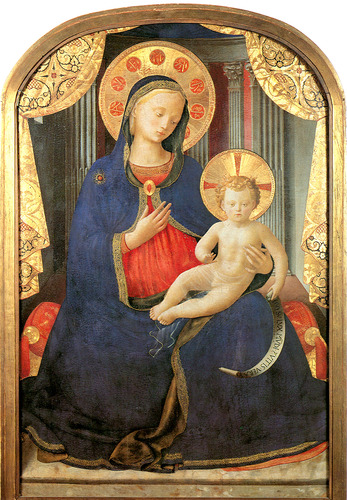
The Life of the Blessed Virgin Mary by Blessed Anne Catherine Emmerich
6. THE ARRIVAL OF THE HOLY FAMILY IN BETHLEHEM.
The journey from the last inn to Bethlehem must have taken about three hours. They made a circuit round the north side of Bethlehem and approached the town from the west. They made a halt under a tree some little way off the road. Mary alighted from the donkey and arranged her clothing, after which Joseph went with her to a large building a few minutes outside Bethlehem, surrounded by courtyards and other small buildings. There were trees in front of it, and round about it were crowds encamped in tents. This was the old ancestral house of David and once Joseph's family home. Relations or acquaintances of Joseph's still lived there, but they treated him as a stranger and as a person whom they did not want to know. This house was now being used for the receipt of the money from the Roman taxation. Joseph, leading the donkey by the bridle, went at once to this house with the Blessed Virgin, because every new arrival had to report himself here and was given a paper, without which he could not be admitted into Bethlehem.[After several pauses Catherine Emmerich spoke as follows in her visionary state:] The young she-ass that runs free has not gone with them here, she has run off round the outside of the town towards the south, where it is flatter and there is a sort of open valley. Joseph has gone into the house. Mary is with some women in a little house beside the courtyard: they are very friendly to her and are giving her some food. These women are cooking for the soldiers. They are Roman soldiers, with strips of leather hanging round their loins. The weather here is very pleasant and not at all cold. The hill between Jerusalem and Bethany is in full sunshine; one has a fine view of it from here. Joseph is in a big room with an uneven floor. They are asking him who he is and are referring to long scrolls of which a great many are hanging on the walls. They unroll them and read aloud to him his ancestry and also Mary's: he did not seem to know that she also descended so directly from David through Joachim; he himself descended from an earlier offspring of David's. The man asks him: Where is your wife?' Owing to many disorders the people of the country have not been properly registered for seven years. [97] I see the figures V and II, making seven [she forms this figure with her fingers]. This taxation has been going on for several months. Some payments were made here and there during those seven years, but nothing regular. The people were made to pay twice over. Some of them stayed here for as long as three months. Joseph came rather late to the tax office, but was treated in quite a friendly way. He has not paid anything yet, but was asked about his means, and stated that he had no land and lived by his handicraft and from the assistance given him by his wife's mother.There are a great number of scribes and high officials in many of the rooms. On the upper floors are Romans and many soldiers. There are also present Pharisees and Sadducees, priests, elders and every kind of official and scribe, both Jewish and Roman. There is no such commission in Jerusalem, but they are established in several other places, such as Magdala on the sea of Galilee, where the inhabitants of Galilee are taxed, and also those of Sidon, I think because of their commercial dealings. Only the people who are not resident anywhere and have no land on which they can be taxed have to present themselves at their birthplace. From now on the tax has to be paid in three months in three installments. Each of these three installments goes to a different object. The first is shared by the Emperor Augustus, Herod, and another king who lives near Egypt. He has rendered some service in war and has a right to a district up in the north, so they have to apportion something to him. The second installment has to do with the building of the Temple; it seems as if it were used to pay off a debt. The third installment is intended for widows and poor people, who have had nothing for a long time, but of all this little reaches the right people, just as happens today. The money is meant for nothing but good causes, and yet remains in the hands of the great. All this business of writing made a terrible fuss and commotion.Joseph was now allowed to go, and when he got downstairs the Blessed Virgin was called before the scribes in a passage, but they did not read anything aloud to her. They told Joseph that it was unnecessary for him to have brought his wife with him, and seemed to be bantering him on account of her youth. Joseph was ashamed of this being said before Mary; he was afraid she might think that he was not respected in his birthplace.
CONTENTS | NEXT | FOOTNOTESCopyright ©1999-2023 Wildfire Fellowship, Inc all rights reserved

 Keep Site Running
Keep Site Running